Disclaimer: This is an opinion piece and not meant to be judgmental, accusatory, or personal. I truly wish the Skiff Privacy founders best of luck in their next venture. This blog post is meant as an informal case study of how Skiff shut down its operation and what they could have done better.
The reader must keep in mind that Notesnook is not a Skiff Privacy competitor, in part or in whole. And as such, this blog post is not meant as a way to take a stab at a competitor. The only part of Skiff that is remotely similar to Notesnook is its Skiff Pages offering, but even that is fundamentally different and solves a very different problem (aimed more as a Google Docs alternative).
Skiff Privacy started out in 2020, publicly launched in 2021-2022, and shut down in 2024. It was a typical VC-backed Silicon Valley startup that quickly gained a lot of traction among the privacy community, but failed to appease its VCs and got acquire-hired by Notion.
A very frequent but unanswered question is why shutdown in the first place? In November 2023, Skiff reported having crossed 2 million users. That sounds like a success but unfortunately, that's not how VC-backed startups work.
The most likely reason for Skiff shutting down is because it has become unviable. You see, Skiff raised around $14 million in seed funding. That's outsider money from VCs which means outside pressure to turn a profit. Since they decided to shutdown, it's obvious that they failed on their promise.
Why Notion, though? It turns out Skiff received funding from Sequoia Capital which is also an investor in Notion Labs. According to Harvard Business Review:
Venture money is not long-term money. The idea is to invest in a company’s balance sheet and infrastructure until it reaches a sufficient size and credibility so that it can be sold to a corporation or so that the institutional public-equity markets can step in and provide liquidity. In essence, the venture capitalist buys a stake in an entrepreneur's idea, nurtures it for a short period of time, and then exits with the help of an investment banker.
Of course, startups fail all the time. That's nothing special but the conduct of the founders in how they carry out a shutdown speaks a lot about what happened, why it happened, and what their priorities/motives were. In this blog post, I want to discuss a few things that stood out to me as completely baffling.
1. Miscommunication
On February 9th, 2024, when Skiff decided to stop operations, this is what they put on their website:

Anyone reading the above would think Skiff is only joining Notion instead of completely shutting down. I mean, they are excited so it must be something good, right? Who is ever excited about shutting down their company? Well, maybe the next few paragraphs would shed more light on the situation?

No mention of shutting down, no mention of discontinuation, not even a single mention of what happens next. Just some vague corporate jargon about "mission" and joining Notion. Their copy sounds like this: "We are joining hands with Notion to continue building Skiff" when it actually means: "Skiff failed to be viable and is being discontinued. The Skiff team is being acquire-hired by Notion."
But where do they even say they are discontinuing? Maybe they aren't discontinuing (and I am lying)!
Click on "Learn about migrating your data" link (why would a user even click on it if they didn't think Skiff is discontinuing?), scroll down and expand the FAQ item:
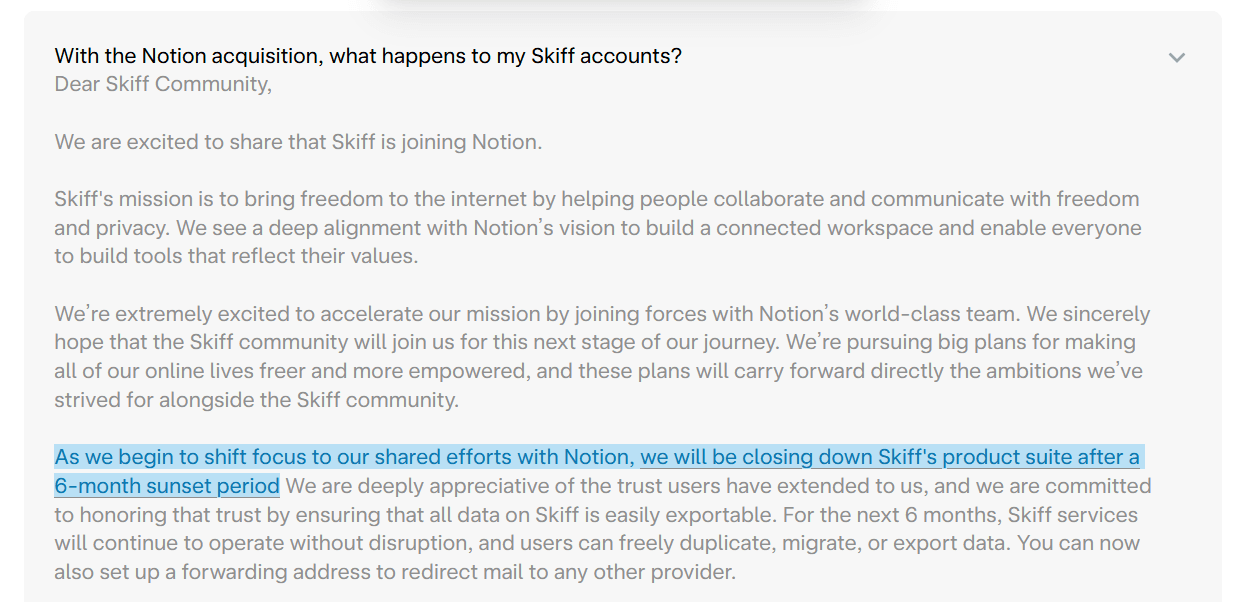
There it is hidden among paragraphs upon paragraphs of pointless marketing speech. How is a casual user taking just a cursory look at their website supposed to notice and understand this important information? They also sent an email to all their users containing this very letter as if that would give more context?
This is nothing new on part of Skiff. Since its inception, Skiff has portrayed itself as a "transparent and completely open source" product lineup:
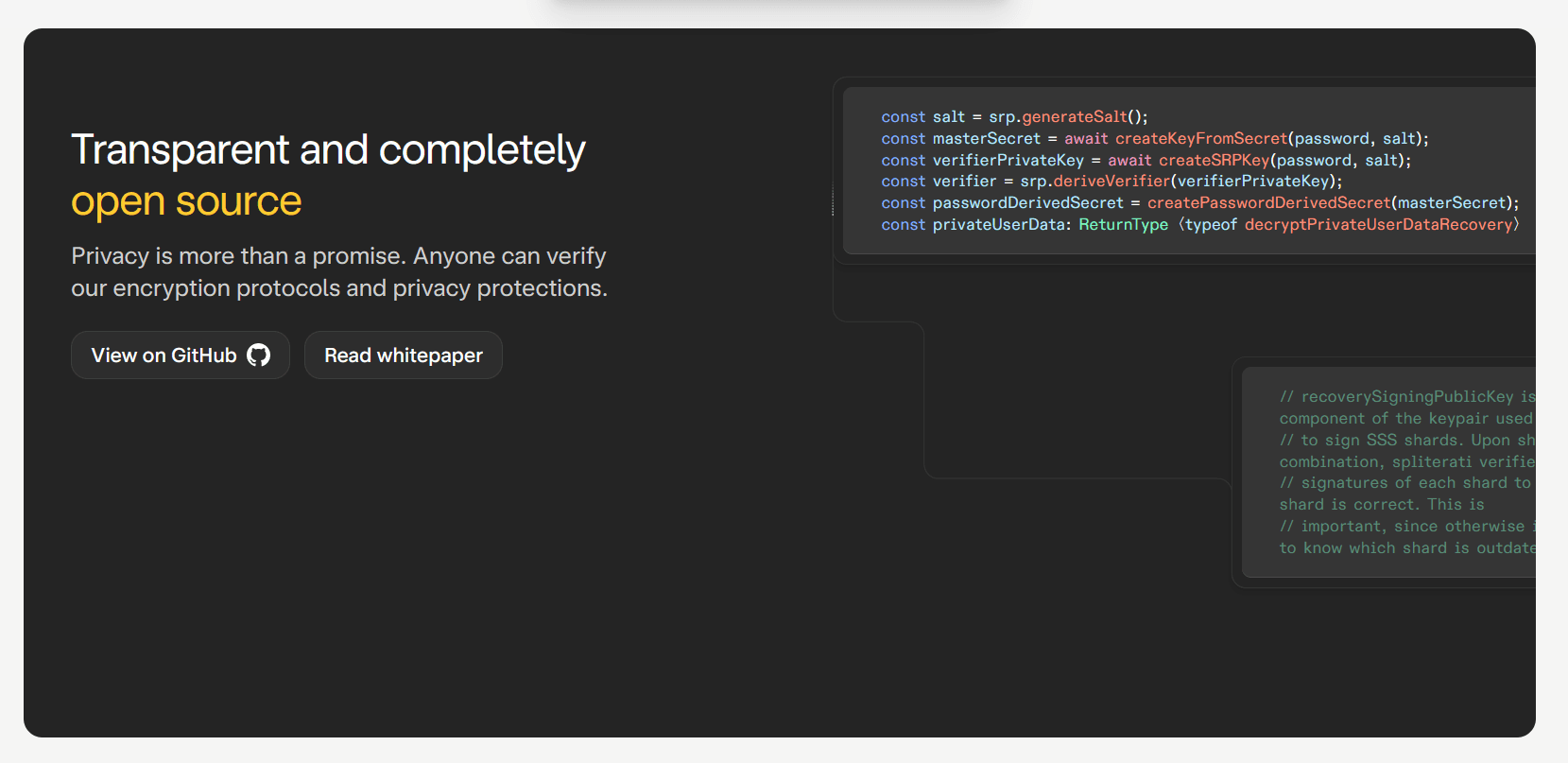
However, if you look a little deeper you'll realize only some parts of Skiff are source available (not open source since their license is not OSI approved). For example, none of their backend servers are open source.
There's nothing wrong with being source available (Signal, Proton Mail are all source available or partially open source), the problem is communication. If you claim in one place that you are completely open source then you also have to back it up. This issue was brought up a few times over the years by different users but nothing ever changed. They neither changed their marketing copy nor their license.
2. Causing a panic
What would you do if you received an email about a mission critical (because email is pretty mission critical) product getting shut down? You'd go to the community forum and ask around to know what's going on, what happened, and what to do next.
How would you feel if you opened Discord and the product's official Discord server was gone? You go to their GitHub repo and the GitHub repo is also gone. You open their Twitter/X page but find no clear information about what's going on except "excitement" around joining Notion and a link to a pointless page that tells absolutely nothing. It's evident that you will panic.
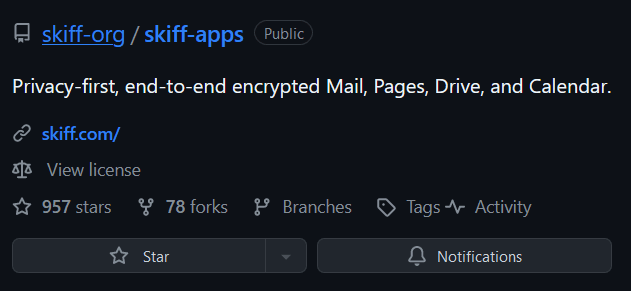
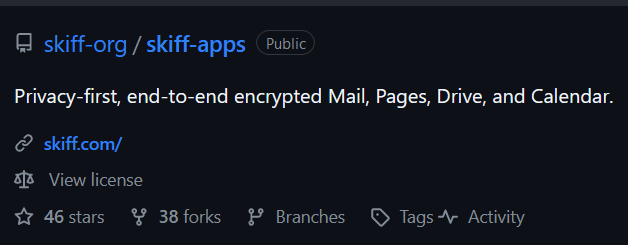
Here's a message we received in our own Discord server from a Skiff user:

There are countless such examples of Skiff user's panicking all over Twitter/X. This panic could easily have been avoided through a more transparent and open process.
3. Lack of empathy
I encourage you to read all of Skiff's messaging around their shutting down. You'll notice an absurdly jolly and excited tone ("we are excited...", "...accelerate our mission...", "...next stage of our journey..." etc.) that completely ignores the frustration and disappointment its users are going through. Hidden in all that corporate lingo and marketing jargon you'll scarcely find a genuine apology.
There is a stark contrast between the jubilant tone of Skiff vs. the disappointment and frustration of its users. It almost feels as if Skiff is happy to screw over its userbase, and "excited" to move on instead of understanding and supporting the community (not saying that's the case but it does sound like it).
The 6 month deadline on top of that adds additional uncertainty that could have been avoided through better and clearer communication. If ever there was a time to be positive, this wasn't it. That's like laughing and joking in the face of your neighbor while their house burns down.
Conclusions
As of 11th February, 2024, the @skiffprivacy Twitter/X account is going around claiming that Skiff's open source repos are still accessible and available (after they already took them down once) ignoring the fact that frontend without the backend is useless.
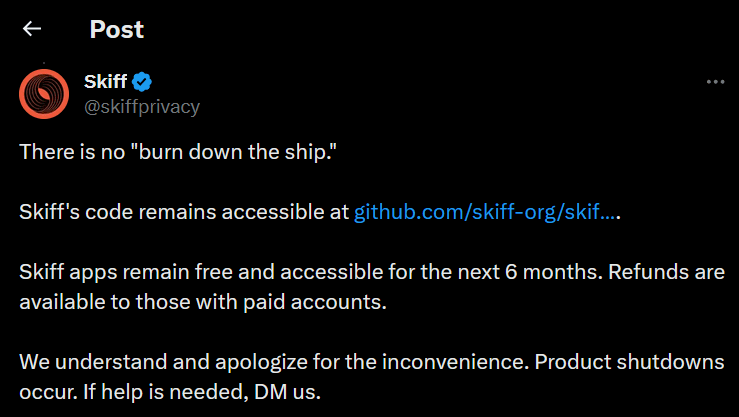
Product shutdowns do occur but if any service is going to shut down, they should keep the following in mind:
Don't lie to your users
Startups fail all the time. That is the nature of startups. But if you are failing, don't try to make it look like a win. Fancy words cannot hide the truth. No one discontinues and shuts down because they "won". Just be honest and communicate clearly. Don't give false hopes like "we are looking forward to...", "...excited about the next stage" etc. That's just pointless and frankly, no one cares what you do after shutting down. It's your product that people care about.
Telling users the why and what goes a long way in establishing trust. Don't keep them in the dark because you are too scared to own up to your mistakes. Communication and transparency around the whole process is essential (especially if you subscribe to the "privacy and freedom" ideology).
Show empathy and face the backlash
When MYKI shut down a few years back, it was one of the most frustrating times for me. No other alternative was satisfactory. I tried Bitwarden, 1Password, LastPass, and all sorts of password managers but none of those came even close (I eventually migrated to Keepass).
Migrating from one tool to another is not a trivial task so show empathy and understand your users. If they are angry, their anger is genuine. If they are frustrated, their frustration is genuine. Don't leave them hanging and helpless. It's not the users' fault that you have to shut down so don't walk all over them.
Running a startup is not easy, and the more users you have the worse the backlash will be when you shutdown but facing the backlash head-on is part of this whole business. You cannot run away so just be as honest, as transparent, and as open as possible.
Good faith gestures
All startups shutting down should open source all their code. Period.
It benefits no one when a startup just blinks out of existence. There are so many examples of really good and useful products that solved real, actual problems but had to close down. It would be phenomenal if all those services published their code before going dark so someone else could take up the mantle.
Any startup genuine about its claims of "mutual benefit" should open source all the code under a permissible license for the sake of public good. If that cannot be done then mass refunds should be issued for all paying customers. It shouldn't be an option given to users but a proactive action done on the part of the startup. If your users trusted you enough to purchase your subscription, the least you can do is a issue a refund when you shut down.
Of course, none of this is enough to placate a frustrated user but it goes a long way in showing that you really did try your best. Otherwise, it just looks like you are swindling people's time and money.
Give your users enough time to migrate
Not all users can migrate in a blink. Many users don't even have the mental capacity to think about migration. You are not only responsible for letting users export their data but also for helping them find and migrate to good trusted alternatives. After all, they trusted you with their time, money, and data so you should return the same courtesy.
How much time is enough time is different for each product but I think establishing an extra margin of a year or two really helps dispel all the panic around the shutdown. That sounds like a lot but a few weeks or months is not enough time to migrate. All it does is create panic while users scramble to find a good enough alternative.
Final thoughts
I wish Skiff didn't shutdown. Just a few weeks back I was exploring it in hopes of migrating our business email to Skiff. They created something really great, and it's unfortunate that they have to discontinue.
If any of the founders from Skiff Privacy is reading this post, I encourage you to open source the backend as well as everything else around Skiff. That'll leave a legacy behind instead of the bad feelings users have currently.
That's it from me. Thank you for reading. If you have any questions, feel free to reach out via email, or on Twitter/X.

